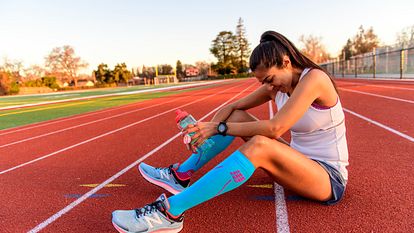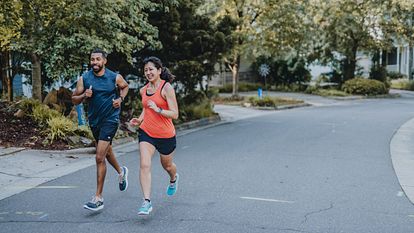What You Need to Know About Heat Training

Tricks to Beat the Heat and Run Strong All Summer Long
Sometimes summer running — especially in the south — feels more like swimming through a hot, sticky (dare we say miserable) pool of murky water than it feels like actual running. So, it’s understandable that you often work hard to avoid it. But, if you’re well-prepared, you don’t have to. In fact, running in the heat might actually be good for your fitness. Crazy, right? But there’s science to prove it.
A recent study found that cyclists who trained in hot temperatures experienced a greater improvement in their overall V02 max (maximal oxygen uptake during intense exercise) than cyclists who trained in cool temperatures. The same study found heat-trained athletes had a higher blood plasma level and a better-than-average ability to sweat faster (and therefore cool off faster) than athletes who rarely trained in the heat.
So, what does this mean for you? We say make the most of your fitness in the remaining dog days of summer ... and stay safe doing it. Here’s how:
Run slower. Heat, especially when combined with humidity, takes a major toll on your ability to run hard. That’s because as your body temperature rises, you start to perspire in an effort to bring it back down. In an arid climate with low humidity, the sweat evaporates, and your body temperature goes down. Groovy. With humidity, though, the sweat clings to your skin like a hot, sticky shield. It can’t evaporate, and so, you stay hot. Your heart rate may rise and your ability to push the pace declines. It may feel terrible, but know this: you're still putting forth the effort and, come fall, you'll reap reward.
To combat heat and sweat, just wear less clothing. Yep, shed the layers and let your skin breathe. Opt for shorts and tank tops (or no tops if you so dare). Make sure your layers are lightweight, light in color and breathable. Also, choose fabrics with sun protection and wear them in combination with sunscreen and sunglasses. Yes, sunscreen is a must.
It also helps to reduce your alcohol consumption and drink more water. We know that a post-run bubbly beer on a hot summer day is pure bliss. However, it can also set you up for major dehydration when you trade H2O for suds. Dehydration not only curbs recovery from the run you just finished, but it also sets you up for a sub-par run the next day.
And, did you know that even slight dehydration impairs mental capacity? So, drink more water throughout the summer, so you have better runs, experience enhanced recovery and function optimally at work. Win-win-win.
Pay attention to when you run, too. Midday running isn’t the evil many people make it out to be; you just have to be prepared. If you’re an experienced athlete or someone well acclimatized to hot weather, then we say go for it. Get your lunch-run sweat on. Just be mindful and drink even more water than you normally would before and after.
Still, even for a seasoned runner, some circumstances may make midday running less than ideal. If you’re in the middle of a heat wave, running on little sleep, experiencing high stress or if you drank one too many brews the night before, consider moving your run to early morning or late evening. Heat stroke is no joke. Don’t attempt to run midday unless you absolutely know your body can handle it.
Make friends with electrolytes. The more you sweat, the more you need. That’s because you’re losing more than water with each drop. The farther you run, the further you dip into your electrolyte reserve. After a short 30-minute jaunt, you can generally replenish all of your electrolytes with your next meal, but if you go much longer, it’s a good idea to substitute with something like nuun or GU Energy Drink Tabs. It's easy to do, just add a tab to your water and go.
You should also carry hydration and plan your routes based on water availability. Getting stuck on a run with no water when you’re thirsty and near bonking is perhaps one of the worst things. Ever. OK, maybe that’s a little dramatic. But still, it sucks. If it’s summer, carry water every time you run, or at the very least take a bottle to stash somewhere along your route (if you’re doing an out and back). It's also a good idea to plan your run according to available water stops so that you can drink from a fountain and refill your bottle or pack. Don’t ever hesitate to stop and slurp; running without drinking water doesn’t make you tougher.
By Ashley Arnold. Ashley is a storyteller, ultrarunner and cat person. As Fleet Feet’s content marketing manager, she manages the Fleet Feet blog and its roster of writers.



Join our Newsletter
Get deals, events, and more.
Connect with Fleet Feet
Get involved on social media.
Find a Location
Fleet Feet has over 250 locations nationwide!
Find a Store